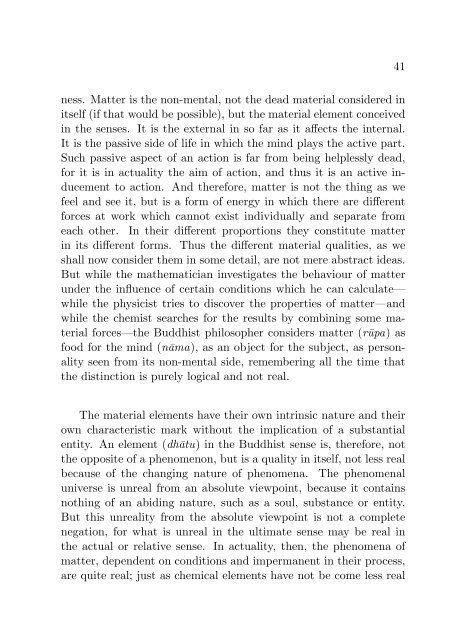Problems Bared, Essays on Buddhism
Essays on various aspects of the Buddha’s teaching.
Essays on various aspects of the Buddha’s teaching.
Create successful ePaper yourself
Turn your PDF publications into a flip-book with our unique Google optimized e-Paper software.
41<br />
ness. Matter is the n<strong>on</strong>-mental, not the dead material c<strong>on</strong>sidered in<br />
itself (if that would be possible), but the material element c<strong>on</strong>ceived<br />
in the senses. It is the external in so far as it affects the internal.<br />
It is the passive side of life in which the mind plays the active part.<br />
Such passive aspect of an acti<strong>on</strong> is far from being helplessly dead,<br />
for it is in actuality the aim of acti<strong>on</strong>, and thus it is an active inducement<br />
to acti<strong>on</strong>. And therefore, matter is not the thing as we<br />
feel and see it, but is a form of energy in which there are different<br />
forces at work which cannot exist individually and separate from<br />
each other. In their different proporti<strong>on</strong>s they c<strong>on</strong>stitute matter<br />
in its different forms. Thus the different material qualities, as we<br />
shall now c<strong>on</strong>sider them in some detail, are not mere abstract ideas.<br />
But while the mathematician investigates the behaviour of matter<br />
under the influence of certain c<strong>on</strong>diti<strong>on</strong>s which he can calculate—<br />
while the physicist tries to discover the properties of matter—and<br />
while the chemist searches for the results by combining some material<br />
forces—the Buddhist philosopher c<strong>on</strong>siders matter (rūpa) as<br />
food for the mind (nāma), as an object for the subject, as pers<strong>on</strong>ality<br />
seen from its n<strong>on</strong>-mental side, remembering all the time that<br />
the distincti<strong>on</strong> is purely logical and not real.<br />
The material elements have their own intrinsic nature and their<br />
own characteristic mark without the implicati<strong>on</strong> of a substantial<br />
entity. An element (dhātu) in the Buddhist sense is, therefore, not<br />
the opposite of a phenomen<strong>on</strong>, but is a quality in itself, not less real<br />
because of the changing nature of phenomena. The phenomenal<br />
universe is unreal from an absolute viewpoint, because it c<strong>on</strong>tains<br />
nothing of an abiding nature, such as a soul, substance or entity.<br />
But this unreality from the absolute viewpoint is not a complete<br />
negati<strong>on</strong>, for what is unreal in the ultimate sense may be real in<br />
the actual or relative sense. In actuality, then, the phenomena of<br />
matter, dependent <strong>on</strong> c<strong>on</strong>diti<strong>on</strong>s and impermanent in their process,<br />
are quite real; just as chemical elements have not be come less real

















